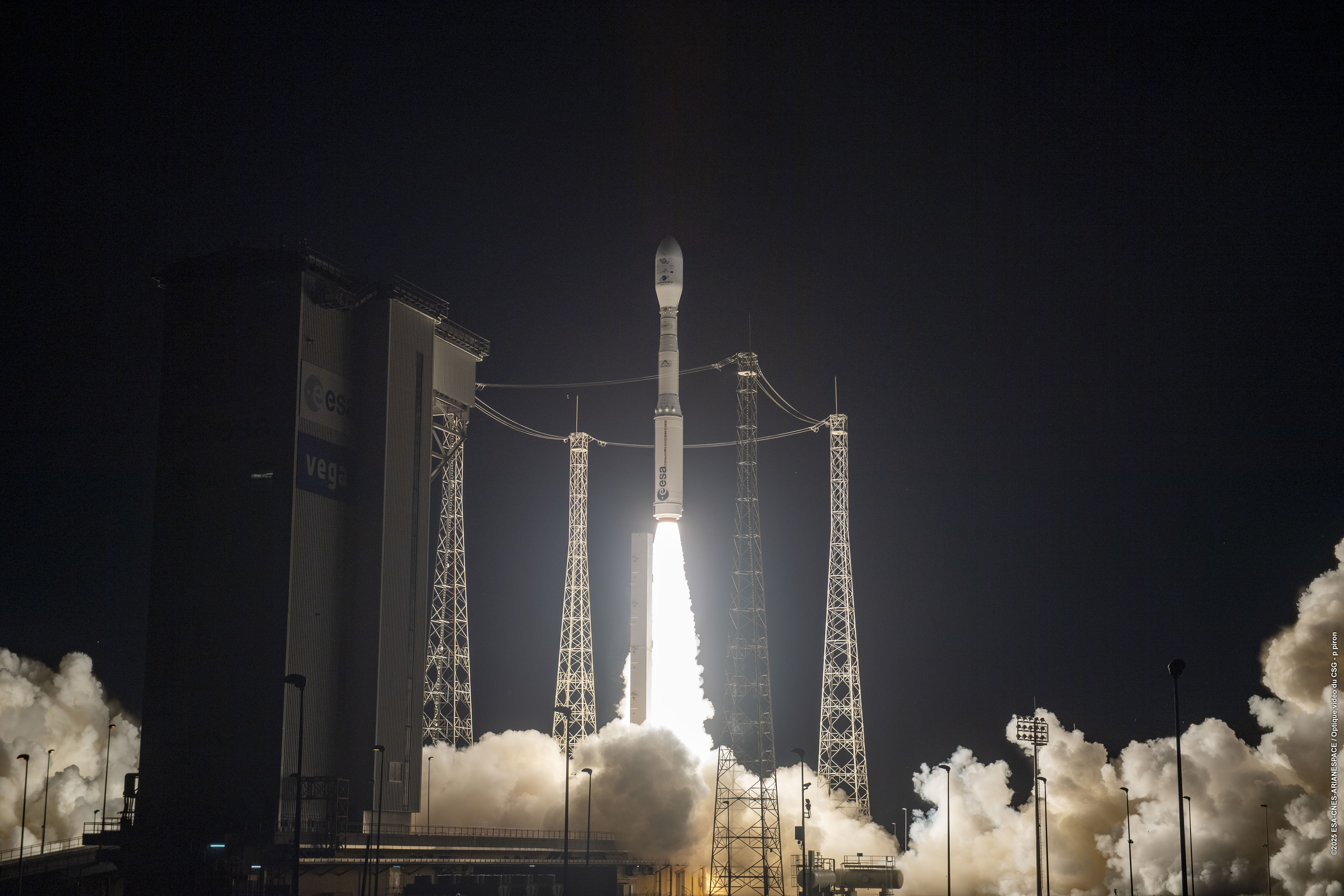
Lift off! Credit: Arianespace
MicroCarb, developed in partnership between the UK Space Agency and French Space Agency CNES, is Europe's first dedicated carbon dioxide (CO₂) monitoring satellite, marking a major milestone in the global fight against climate change.
Successfully launched aboard a Vega-C rocket from Kourou, French Guiana on Saturday 26 July, MicroCarb will join the international greenhouse gas virtual constellation of satellites, significantly enhancing global climate monitoring capabilities.
Unprecedented precision from space
Orbiting 650km above Earth, MicroCarb will use city-scanning technology to map CO₂ emissions across urban areas at 2km x 2km resolution – a level of detail never before achieved from space. This precision is crucial for understanding emissions from cities, which are responsible for over 70% of global CO₂ output.
This capability is supported by the satellite's Pointing and Calibration System (PCS), designed, developed, and tested at RAL Space. This critical component steers the satellite's view to allow scanning of specific locations, whilst providing necessary on-board calibration to ensure highly precise measurements throughout the mission's lifetime.
Beyond urban emissions, MicroCarb will also monitor natural carbon sinks including forests and oceans, helping scientists understand how much carbon our planet absorbs and where. The satellite will also measure Solar Induced Fluorescence – a faint glow emitted by plants during photosynthesis – providing valuable insights into the carbon cycle and supporting direct measurements of CO₂ in the atmosphere.
UK expertise at the heart of MicroCarb
MicroCarb showcases British space industry excellence, with UK teams playing central roles throughout the mission's development.
Following the PCS delivery to Airbus in France in 2020, RAL Space welcomed the entire satellite back to Oxfordshire in December 2022 for its final assembly, integration and test phase.
Working alongside Thales Alenia Space (UK) who led the campaign, RAL Space teams put the satellite through rigorous vibration, shock, and thermal vacuum tests to ensure it could withstand the harsh conditions of launch and space. RAL Space also manufactured some of the satellite's multi-layer insulation blankets that protect it from the extreme temperatures it will face in orbit.
A critical tool for climate action
Backed by £15 million from the UK Space Agency, MicroCarb illustrates the power of international collaboration in tackling climate change.
As the world races to limit global warming to 1.5°C, the mission will join an international constellation of greenhouse gas monitoring satellites, providing the transparent, verifiable data needed to hold nations accountable for their climate commitments.
The first MicroCarb data products are expected to be released in roughly 1 year, offering insights into major urban emitters and the performance of natural carbon sinks. These findings will feed into international climate assessments and future satellite missions under the UK's Earth observation roadmap.
Paul Eccleston, RAL Space's Chief Engineer during the development of MicroCarb's Pointing & Calibration System, said:
“MicroCarb's successful launch is a real moment of pride for our colleagues at RAL Space. Years of hard work from our teams and all the others across the UK has led to this milestone. Now comes the exciting part: seeing the data come back to Earth and knowing it will make a real difference in climate science."
Dr Paul Bate, Chief Executive of the UK Space Agency, said:
“Satellites like MicroCarb are our eyes in the sky. Over half of the critical data we use to understand climate change comes from space, and MicroCarb's successful launch is a major leap forward in our ability to track carbon emissions and absorption with unprecedented accuracy, from the world's cities to its forests and oceans.
“Backed by UK and French investment and expertise, it's a proud moment for both our space sectors and a powerful example of international collaboration in action."
